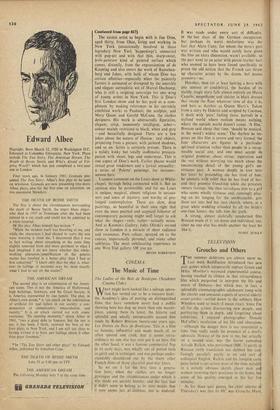CINEMA
The Music of Time
The Ladies of the Bois de Boulogne. (Academy Cinema Club.) WHAT might have looked like a salvage opera- tion has turned out to be a treasure hunt : the Academy's idea of putting on distinguished films that have somehow never had a public showing here has dug up more than one master- piece, among them its latest, the bizarre and splendid and wholly unrepeatable second film made by Robert Bresson twenty-one years ago, Les Dames du Bois de Boulogne. This is a film so famous, influential and made much of, so often quoted and cited, that it seems extra- ordinary no one else has ever put it on here. On the other hand, it was a famous commercial flop in its early days, was wholly out of period both in spirit and in technique, and was perhaps under- standably shouldered out by the many other French films of those chockful post-war years.
So we see it for the first time a genera- tion later, when the clothes are no longer grotesque and the circumstances under which it was made are ancient history; and the fact that if 'didn't seem to belong to its time means that it now seems just as timeless, just as undated.
It was made under every sort of difficulty, in the last days of the German occupation. but perhaps its worst misfortune was the fact that Alain Cuny, for whom the hero's part was written and who would surely have given the film an extra dimension, wasn't available, so the part went to an actor with patent-leather hair who seemed to have been found specifically to prove the old notion that the French can throw up character actors by the dozen, but jeunes premiers—no.
Heroless, then (or at least lacking a hero with any interest or credibility), the burden of its stately, tragic story falls almost entirely on Maria Casares, magnificent and sinister in black dresses that sweep the floor whatever time of day it is, and hats as dateless as Queen Mary's. Taken from a story by Diderot and scripted by Cocteau, it deals with 'pure' feeling (love, hatred) in a stylised world where realism means nothing, where the outside world doesn't count. 'A film,' Bresson said about that time, 'should be musical, in the word's widest sense.' The rhythm he im- poses on this film is severe and very formal, the four characters are figures in a particular spiritual situation rather than people in a recog- . nisable social one, and one must accept its original premises about virtue, reputation and the rest without worrying too much about the Unconvincing detail of the young girl's un- virtuous past. A woman deeply in love tests her lover by pretending she has tired of him; he answers with relief that he has tired of her; and they promise friendship while she privately swears revenge. She then introduces him to a girl who seems wholly virtuous and, cunningly play- ing on his longing for the unobtainable, gets them not into bed but into church, where, at a great white wedding attended by all the bride's one-time lovers, she tells him the truth.
A strong, almost skeletally unadorned film Bresson made of it: yet dense and individual, too, since no one else has made another the least bit like it.
ISABEL QUIGLY






































 Previous page
Previous page